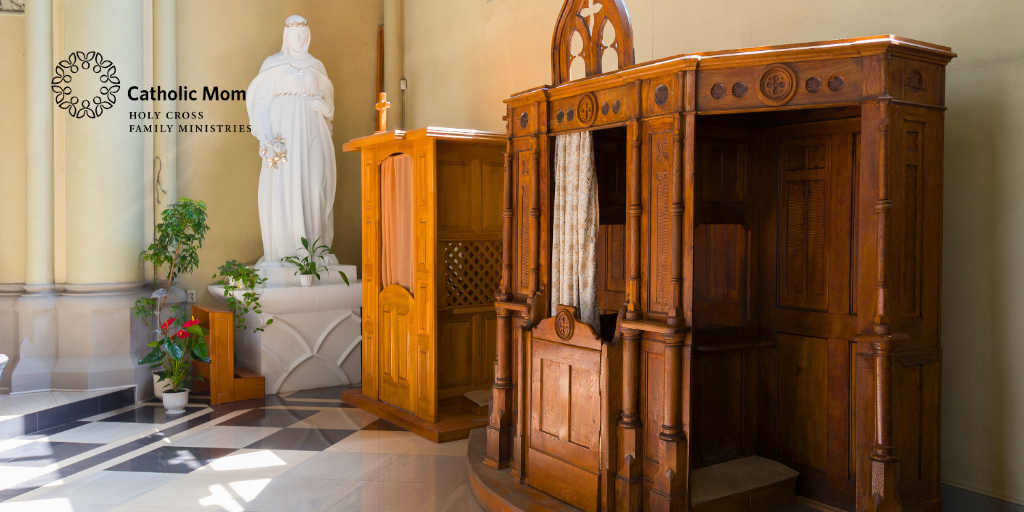
Amanda Woodiel uses what she learned in her moral theology class to go deeper in preparing for Confession, a move that is both uncomfortable and fruitful.
If you’re like me, when you go to Confession, you start with the ten commandments. Did I lie? Did I cheat? Did I steal? If you are feeling very prepared, you might use one of those examinations of conscience that expand upon the commandment: “No, I didn’t kill. But did I slander? Did I gossip?” Then you enter the confessional and make your report: “I did this thing this many times.”
Peeking Under the Sin
Recognizing the fact of sin is a great start. But if we go a step further, we can peek under the sin. Why did I do that? This is called the intentionality of an action, and it tells us a lot more about ourselves. A certain sin — for example, lying — can have multiple reasons behind it. Was it to look good (pride)? To not have to share (avarice)? To get back at someone (wrath)?
In fact, when we do this, we’ll see that all of our sins point back to one of the seven capital sins, which is exactly why they’re called “capital.” They are the “head”; from them all other sin springs. Now there’s something additional to confess! “I lied because I care what other people think of me.”

Looking Behind Good Actions Too
There’s another angle we should examine before we head into the confessional, and this one may be surprising. Take a few minutes to examine the intention (the why) underlying your good works. The same act can have diverse intentions given different people or scenarios. Maybe you took a meal to your neighbor. Was it because your neighbor has looked slender lately and you wonder if he has enough food to eat (laudable!)?
Or was it because your neighbor has a mower and yours is broken and you want to play your cards right so that he lets you borrow his? In the latter case, the intention of your act is love of self, not love of neighbor. In Matthew 6, Jesus has stark words for bad intentions underlying good acts:
“[But] take care not to perform righteous deeds in order that people may see them; otherwise, you will have no recompense from your heavenly Father. When you give alms, do not blow a trumpet before you, as the hypocrites do in the synagogues and in the streets to win the praise of others. Amen, I say to you, they have received their reward. ... When you pray, do not be like the hypocrites, who love to stand and pray in the synagogues and on street corners so that others may see them. Amen, I say to you, they have received their reward. ... When you fast, do not look gloomy like the hypocrites. They neglect their appearance, so that they may appear to others to be fasting. Amen, I say to you, they have received their reward.” (Matthew 6:1-2, 5, 16)
Praying, fasting, and almsgiving are all good objects, but doing them with the wrong intention (such as to win the admiration of others), negates the potential goodness of the acts. Wow — we really had better pay attention to why we do things! Many a vice has masqueraded as virtue. What a travesty to get to the end of life and realize that we had been loving ourselves in our good acts all along!
Our “Last End”
As you genuinely reflect on both your good and bad actions — always asking the Holy Spirit to reveal yourself to you — you are likely going to notice patterns in your life. You’ll notice that both your sins and your good acts are played out against a backstory that becomes familiar. It may be that you often are worried about how you look in front of others or that you are often concerned that you get “your share.” As these patterns are revealed to you, you are in a really beautiful position from which you can prayerfully consider what Thomas Aquinas called your “last end.”
Your “last end” doesn’t mean the last thing you do before you die. It means your highest good. You might even call it where you place your happiness. As Christians, of course, our highest good, our happiness should be God. As fallen Christians striving toward holiness, however, if we examine our actions, we will notice how often that is not truly the case. It just might be that although I wouldn’t say that my happiness depends on having enough money in my bank account, my actions show that that is in fact where I believe my happiness depends. In other words, our “last end” is our ordering principle behind all that we do — where we believe our happiness lies.

This kind of bald honesty with ourselves is hard and scary, I know, and I repeat that we must ask the Holy Spirit to show ourselves to us. It’s a lot easier to report sins and number of occurrences than it is to reveal our true selves (what we believe about ourselves, our neighbor, and what we truly strive for) to God. In this effort, though, I promise you manifold graces from God who, let’s face it, already knows what we do and our intentions behind our actions. Deepening our humility and developing a more profound trust in God’s mercy along with the healing and strengthening graces of a good confession will put us farther on the path to making God — our true ordering principle, our true “last end,” our true happiness — our own “last end.”
Share your thoughts with the Catholic Mom community! You'll find the comment box below the author's bio and list of recommended articles.
Copyright 2025 Amanda Woodiel
Images:
About the Author

Amanda Woodiel
Amanda Woodiel is a Catholic convert, a mother to five children ages 14 to 6, a slipshod housekeeper, an enamored wife, and a “good enough” homeschooler who believes that the circumstances of life—both good and bad—are pregnant with grace. Her oldest son was diagnosed with cancer in the summer of 2022, which is providing plenty of opportunities to test that hypothesis.


.png?width=1806&height=731&name=CatholicMom_hcfm_logo1_pos_871c_2728c%20(002).png)
Comments